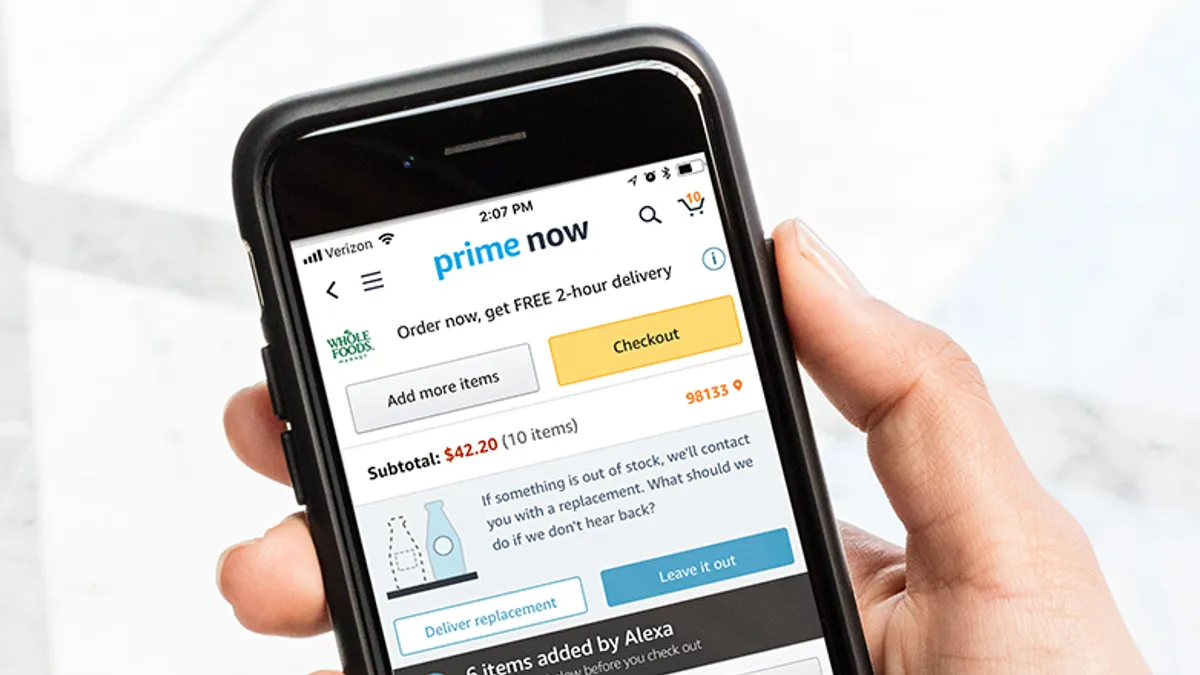Dive Brief:
- Almost half (48%) of surveyed consumers trust Amazon the most among companies handling their personal data, putting the online retailing giant well above tech rivals, like Google and Apple, along with bank, hotel and airline brands, according to new research by SmarterHQ shared with Marketing Dive. Amazon earned particularly strong favor from Gen Zers and millennials, who trust the company more than two times the amount they do banks. The age groups overall trust companies with their data 47% more than Baby Boomers and Gen Xers.
- Social media companies landed at the bottom of the list, earning trust from just 6% of the more than 1,000 consumers polled by SmarterHQ. Half of respondents claimed to know someone whose social account was hacked, a major factor contributing to the skepticism. Despite broad levels of distrust toward tech and social media companies, the study found that owners of smart home devices are 16% less protective of their data and 12% more trusting of brands that accrue and apply it to their businesses.
- These findings come as 86% of consumers grow worried about their data privacy and 79% think companies have too much information on them. Personalization is key, but 63% of consumers will stop purchasing from brands that take a "creepy" approach to marketing, including through tactics like push notifications, which 74% of respondents viewed as invasive.
Dive Insight:
As Amazon has rapidly grown a business in e-commerce, advertising and elsewhere, it's been largely free of the high-profile data controversies that have rocked rivals, like Facebook's Cambridge Analytica scandal, and led to the current climate of consumer concern and regulatory scrutiny into data privacy. However, Amazon will need to be increasingly cautious and careful in choosing its ad tech and data marketing partners in order to avoid similar controversies and potential fines that could be imposed under a proliferating crop of laws and proposed bills around data privacy in the U.S.
Amazon outperforming banks when it comes to trust is perhaps a response to fraud issues that have hit the financial services sector in recent years, notably impacting brands like Wells Fargo. Millennials and Gen Zers having a particularly low perception of banks when compared to Amazon is also possibly reflective of many of them growing up during the Great Recession. But beyond trusting how Amazon collects data, consumers appear receptive to how that data is used to personalize their experience on the platform.
Amazon has the benefit of being a destination where many consumers now begin their purchasing journey online, meaning that targeted ads and offers might be seen as less invasive than they would be elsewhere. The SmarterHQ findings echo other research around how smart personalization supports e-commerce services.
A study by Maritz Motivation Solutions and researchers with the Harvard Business School found that product pages that offer transparently-worded messages, like "recommended based on your clicks on our site," tend to perform better with users. Frequent shoppers also likely have a better understanding of the value exchange tied to their data, as those who shop often view personalization marketing tactics as 25% more helpful, according to SmarterHQ.
Amazon being perceived as especially trustful among consumers could boost the company as it continues to build out an advertising business to compete with Facebook and Google. While its share of the total digital advertising market remains comparatively small, that could change in the coming years as marketers in categories like packaged goods try to meet consumers where they're spending more of their time shopping online.
Forecasts from eMarketer project that Amazon's U.S. ad business will grow more than 50% this year, reaching 8.8% of the total market. That figure will climb to 10% in 2020, eMarketer estimated, while the shares of Facebook and Google will continue to slip. Forrester Research has recently offered similar projections, suggesting the Seattle-based e-commerce giant will continue to win over more search advertising budgets from Google going forward.













